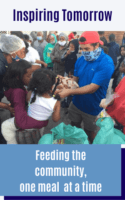Due to their vulnerability, it is unfortunately true that children are the ones that pay the heaviest price when there’s a family feud. Twenty-year-old Xolamzi Mqhayi, from Mthatha in the Eastern Cape, knows how it feels when family members pull in opposite directions.
“Mom got us [Xolamzi and his sibling Thandokazi] at an early age and so my granny was the one who fed us. She unfortunately passed away in 1999 – and our family evicted us out of the house! They claimed that our mom was ‘too young to look after us on her own’ but we saw right through them. All they wanted was to sell the house,” he recollects.
He’s currently a third year student doing a Bachelor of Science in Geology at the University of Cape Town (UCT), but he didn’t leapfrog over hardship to get where he is.
“The family division meant that we missed out on that family support, cos my mom couldn’t ask for their help. They would have ‘reminded’ her every chance they got that she wasn’t fit to raise us on her own. They alienated her so she could run back to them and ask for their help,” Xolamzi maintains.
You probably presume that their father vanished without a trace, but he lived just few blocks away – lavishly. “We knew our dad and where he stayed but he couldn’t care any less about our wellbeing. He was a successful man but he’d rather stay as far away as possible from us. He didn’t even know what grade I was doing or which school I went to,” he says.
Xolamzi’s mom knew that her kids put their faith in her, but she put hers in God.
“She had piece jobs just to make the ends meet. Sometimes you’d have a meal knowing that it could be your first and last one [for a while]. She used to tell us, ‘I didn’t go to school but I’ll ensure you’re educated even if it is the last thing I do’. Our tomorrow was so uncertain, only prayer brought us another day.”
After years of sweat and blood, her prayers began to bear fruit. “In 2009 she got a job as a matron and she would say she was in a more stable job now, and that she aspired to send me to one of our private schools.”
Unfortunately, that ‘fruit’ only lasted a short while before it started to decay. “In June 2009 we heard that she fell sick while my sister and I were on holidays. She later got hospitalised and right after that we were suddenly asked to come back home,” he remembers. They were asked to go to a neighbour’s house but they disobeyed and went straight home.
“We could feel that something wasn’t right; even our bus almost had an accident on our way back. The yard was packed and one family member told us to ‘stay strong’. While struggling to connect the dots, we were told mom was no more.”
Xolamzi’s mother passed away exactly ten years after her own mother and the pain was ten times more excruciating. “That was a turning point in my life. Yes, we were struggling but at least we had her. She was everything to us. She was the reason we woke up every day and looked forward to another day. We now stayed on our own and things went from bad to worse. Life began to lose its meaning. We didn’t even know why we woke up and went to school.”
Life wasn’t getting any better for Xolamzi but he had to progress to high school, something that came with its own tough lessons. He had to go and look for a school on his own.
“I put on my primary uniform and headed straight to school. I didn’t have anything with me but the desire to get educated. It started to hit me that I was poor when other children took out their receipts and I had not paid my fees. Their parents accompanied them but I had no-one to hold my hand. No-one cared if I got a school place or not.”
Eventually a Good Samaritan who was married to his maternal grandfather lit his way. “Granny gave me a R20 to go apply at the same private school my mom wanted to get me into. The school was Roman Catholic and it was so fitting that I am as well. So I went there as a walk-in and [after negotiations] I got admitted. God was on my side because I got admitted and they gave me free high school education,” the school was Khanyisa High School.
His sister was already in varsity at this point, before she was later financially excluded. How did they survive?
“We befriended people who were close by so we could eat at their place when we had nothing. But, you know, eventually friends get tired as well. What got to me was that my father’s family lived nearby but they never bothered to ask about my academics. We even got used to having water for supper…” he says, his voice wavering, and with teary eyes.
Besides having to walk four kilometres to and from school, Xolamzi’s schoolwork took a knock as well.
“In 2011 I collapsed at school ‘cos of being hungry and I couldn’t attend the following day cos I’d be laughed at. I was [later] isolated into a class that had Mathematics underperformers only.” He became determined to be promoted out of that class, thinking: “You can only improve your grades if you associate yourself with people who’ve a firm grip of the subject.”
His sister soon learnt she was pregnant, right after her varsity exclusion. “Our father paid a mere R250 monthly for child maintenance. All the money would go towards the baby’s needs. My sister had to eat something as she was breastfeeding. Going to bed hungry became an everyday thing in 2011.”
“I had to introspect and change the situation around. I learnt to accept the things I couldn’t change. The spirit of being an optimist told me other kids were going through worse in the streets. I couldn’t change my situation but my attitude had to shift.”
Xolamzi proved that a positive attitude leads into positive outcomes.
“I eventually improved and passed Maths with level five. I thought to myself that if I managed to pass it then I could get past everything in life. That’s how much of a confidence booster it was to me. I started to believe that I knew Maths and that mentality helped me score high in other subjects as well.”He adds that his neighbor, Mrs Rubushe, also contributed a lot because she ensured that he never again walked to school on a rainy day by giving him a transport fare.
Not only did that boost his morale, he received accolades to show for it. “I was invited to the school awards ceremony where I scooped three prizes, securing first place in Physical Sciences, second in both Mathematics and Life Sciences. Then the support poured in. People gave me varsity and bursary application forms. The school would forward our forms to the respective varsities and pay for us.”
He passed his matric in 2013 with flying colours and soon universities were on his phone offering him places, but there was also one rather unexpected call.
“I got a call from my father. He had never, ever, called me before. He was calling to congratulate me, but did he even know where my school was? How I struggled my way through school? Did he even know the condition of the phone he was calling me on? Those questions came into my mind as I saw the call coming in … and I just couldn’t pick it up.”
People assumed his father funded his studies but he credits one organization but he was reaping the fruits of his labour. “ Rural Education Access Programme (REAP) provided for me. REAP doesn’t just give you financial assistance, they ensure that they trim all the loose ends that can affect your academic progress. They help you deal with personal matters through their professional and easily accessible student advisors.”
“REAP’s workshops helped me a lot. The majority of the people I came to Cape Town with were excluded because they didn’t have the same support system that I was getting from REAP. God couldn’t come here so he placed certain people to deliver us.”
REAP encourages their beneficiaries to participate in community work and Xolamzi couldn’t be happier. “I need to give back because I’m here because of other people. I’m a peer buddy. I ensure first years have a smooth transition into varsity. I got help from people who were not obligated to help me. During June holidays I go and tutor matriculants in Maths and Physics in the Eastern Cape.”
Xolamzi is also working on video, interviewing students to find out about the conditions they study in. “The video airs students’ grievances and highlights the conditions they have to study under. I feel like we can only address the poor pass rate if we bring these into lights. People must know the situation is not as glamorous as government portrays it. I’m hoping to secure funding for computers so that students can do their assignments.”
One way Xolamzi draws his strength is from the inspiring motivational quotes he’s read and internalised.
“‘Your situation and circumstances don’t determine your destination. They’re just to strengthen you and make you hungry for success.’ ‘It’s not important where you stand as much as where you’re going.’ Such quotes motivated me cos I knew the words came from people who’ve been down the road.”
He concludes by weighing in on his current relationship with his family. “I don’t blame or hold any grudges against them. I don’t think I would’ve worked that hard if I had a guaranteed meal every night. God made me suffer so I could see education as an only way out, and education gave me the way out indeed.”
“I’m not telling you it’s going to be easy, I’m telling you that it’ll be all worth it,” he concludes, using his favourite quote.
***






